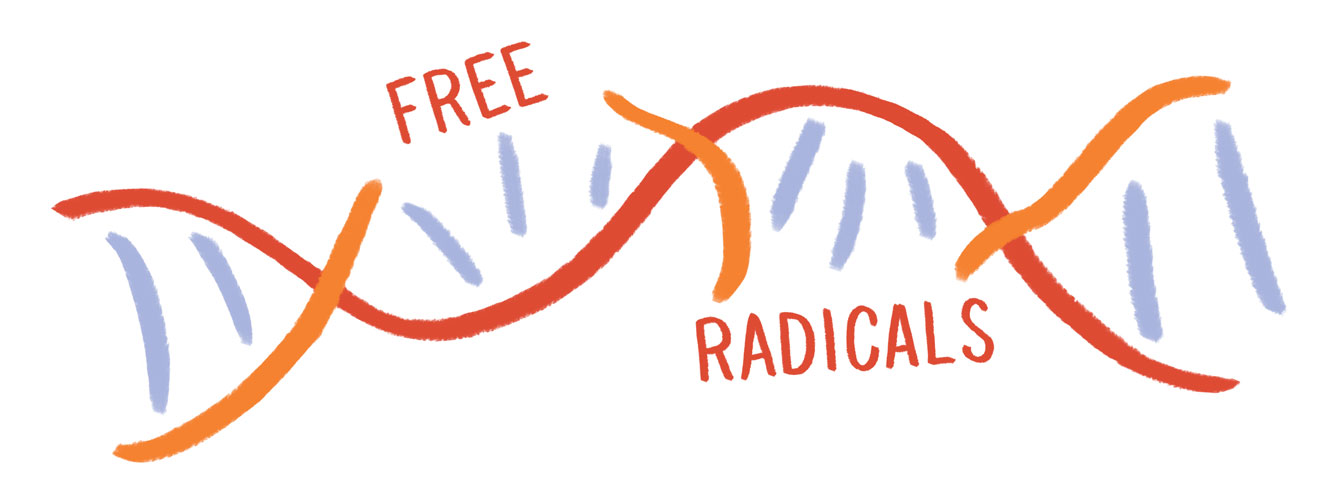
A digital illustration: on the left there are protestors holding signs that say 'Free Palestine'. On the right are scientists working with corporations under an Israeli flag. Artwork by Mariah-Rose Marie M .
In January, scientists from Europe, the United States, and Palestine gathered at a meeting in Cambridge to discuss the state of science in Palestine, listen to the perspective of Palestinian academics working within and without the occupied territories, and brainstorm concrete responses to the problems presented. In my own experience both as an undergraduate science student in Texas and as a graduate researcher in England, scientists are at least sympathetic to, if not earnest supporters of, the Palestinian cause. So, I was roundly surprised when the topic of the academic boycott came up – a tactic overwhelmingly supported by the Palestinian academics in attendance and Palestinian civil society in general – many in attendance became defensive. “The academic boycott goes against the spirit of science,” “scientific activity must be free,” “not all Israeli academics,” “not all forms of research activity support the occupation!”
I suspect this is due in part to confusion about what the academic boycott entails. The academic boycott calls on academics and institutions all over the world to, firstly, refuse to collaborate with the Israeli state as well as academic and cultural institutions complicit in the ongoing occupation of Palestine and, secondly, to avoid avenues of research which support private corporations profiting from settler-colonialism. The boycott is not, as some might think, a boycott on individual academics in particular, or all Israeli academics regardless of affiliation. Complicity in the occupation does not fall on ethnic, religious, and national lines – this point is essential, as it forces us to think more critically about how we carry out our research while continuing to reject the Islamophobia, anti-Semitism, and ultranationalism which pervades the mainstream discourse surrounding the Israeli-Palestinian conflict in the West. The decades long Israeli occupation of Palestine is a clear example of how the supposedly neutral and benign institution of science can indirectly, directly, and even enthusiastically support not only the destruction of human lives but the stymying of scientific production and education.
Can there be a ‘Neutral’ Science in Palestine?
Israel already practices a de facto boycott of Palestinian research and academic institutions. Palestinian universities are raided and forced to close without notice. Students are held and turned back at checkpoints and prevented from attending class. Researchers are prohibited from importing essential laboratory equipment under a blanket ban of supposedly “dangerous” technology. Palestinian academics and students critical of Israel and its occupation are arrested and detained without trial or clear offense. Palestinians in the occupied territories face often insurmountable barriers to international travel, which is critical for the dissemination of knowledge and professional development in science. In the face of this overwhelming reality, arguing that the academic boycott is an assault on ‘academic freedom’ is at best absurd and at worst obscene.
The resistance to the boycott was animated by a singular stubborn myth: Science is neutral, benign, universally and intrinsically good. On closer inspection, science cannot seriously claim to be any of those things and the Palestinian context only makes that fact more obvious. The technologies of mass surveillance, military suppression, and migration control employed by the Israeli state are closely linked to Western science. The massive profits which fuel the ceaseless settler-colonial project in the occupied territories are dependent on the products of the Israeli academy and industry. The prestige of Israeli academic institutions attracts scientific talent from every corner of the Earth and converts them into a kind of diplomat. Practitioners of a disinterested and beneficent profession of science project an image of Israel far removed from the unending violence of the occupation.
None of these statements will come as a surprise to observers of the occupation or those of us invested in ‘decolonizing’ science. However, even amongst supporters of boycotts, divestments, and sanctions (BDS) as a viable tactic of resistance to the Israeli occupation, some doubts remain. If we employ BDS at an institutional and structural level, how can we justify impeding the pursuits of individual scientists? How can we practically uphold BDS in a highly interconnected and viciously competitive global scientific environment? These questions are instances of a more fundamental question: What does it mean to transform science into a politically active, democratic, and emancipatory pursuit in the service of human needs?
Scientists are Workers Too
As scientists, we must affirm the myriad ways in which our professional activity can directly or indirectly harm human beings and take collective action to not only determine where and how this is the case but how to prevent further harm. I emphasize collective action because for much of our profession, scientific production has been organized into a constellation of small independent, competing groups of individuals.
The history of science is itself often told as the gradual production of knowledge by a parade of heroic individuals. We know that this is only part of the story. Scientific production depends on a hierarchy and diversity of labor: undergraduates, graduate students, postdocs, faculty and industry investigators, technicians, lab managers, human subjects, animal models and their handlers all contribute to the work in their own way.
This has only become more apparent as nearly every field becomes more interdisciplinary, more capital and time intensive, and more dependent on cutting-edge technology and computation. The mechanisms through which scientists are funded, employed, develop their research, and advance their own careers do not reflect this reality. Thus, it is challenging to imagine how the academic boycott could be implemented to full effect even when most scientists are in near agreement about the essential problems at hand. We must imagine a better way, and to do so requires that we acknowledge that science is something that we do together in a way that is accountable to all who participate in its production and reflects our collective interests.
This second point follows from the first: scientists are workers and human beings and as such should have control of not only what they work on, but to what end. The anxiety of having your research ‘scooped’ by another group, that someone else might win that grant, that postdoc position, that funding stream, that promotion if you don’t pursue some particular direction are all consequences of a highly competitive professional ecosystem. The conditions which produced the current ravaged scientific climate are themselves products of a global economic order which prioritizes profit over human needs and is driven, fundamentally, by the exploitation of labor. The critical question is not, however, simply how we find more money to do science, but how to best marshal existing resources in the most humane and productive method possible.
Today, basic science departments everywhere are struggling to merely maintain a fraction of the technological equipment necessary to push the cutting edge of their respective disciplines. At the same time, pharmaceutical companies are replete with cash, injecting billions into the development and testing of drugs which barely innovate on existing treatments, if at all, just to bring any new product to market. Conversely, less profitable avenues of research (often less profitable precisely because they investigate problems related to the poorest, most marginalized persons) remain relatively unexplored.
To place these concepts in context of the academic boycott, let us suppose that you are a principal investigator broadly interested in optics and image processing. A local security technology startup offers you a stream of funding for your group to develop a camera miniaturization research program. You are aware that the startup’s main customers are militaries and military contractors, including the Israeli military and private security firms operating in occupied Palestine. Our current predicament is such that the onus to do the right thing – turn down the money – is wholly on the investigator as an individual. The products of the research may or may not be able to be published and the researchers who work on the program will have no way of controlling how their discoveries are eventually exploited, and will likely never see a cent of the ultimate profits. To turn down the money is to essentially hand the money over to someone else, who in all likelihood will eventually accept it. Yes, I support the academic boycott, this investigator might think, but will everyone else in my field?
One way to tackle this problem is to shift responsibility from the individual to professional organizations and research collaborations. Trade and student unions have taken the lead in this regard over the last few years, empowering people to take action through existing democratic bodies. The potential impact of following this approach in the academy, from individual departments to massive international collaborations like CERN, should not be underestimated.
Science for Liberation
Summoning the will to not only condemn the obvious inversion of priorities governing our professional existence, but to seize the power to set them ourselves, must be a goal of science if it is to be an emancipatory pursuit. The existential terror brought about by every leap in artificial intelligence, for example, demonstrates how the broader organization of society (that is, one in which you must work or starve) actively hamstrings our ability to fully develop our scientific capacity.
The organization of society must also become an object of scientific interest if science is to become a pursuit in the service of the emancipation of others as well. The unwillingness on the part of scientists to risk their professional livelihoods by supporting the academic boycott is just a single consequence of a mode of scientific production that is not truly free. That this unwillingness can translate into indirect support – however reluctant or minor – of the Israeli occupation demonstrates the urgent need to reform the way we as scientists relate to our labor, one another, the oppressed, and the global community in general.
The call to boycott, divest from, and sanction (BDS) Israel is broadly supported by Palestinian civil society precisely because it has proven once before to be an effective, nonviolent tool for weakening an oppressive state, referring to apartheid South Africa. Further, we should think of BDS as a call for professional organizations, institutions, and scientific associations to, as a group, enforce the academic boycott of Israel. The question of how to enforce BDS in such a context is a complex one, but our goal should be to develop a collective mode of action instead of placing the burden wholly on individual scientists.
In the spring of 2015, Israeli president Reuven Rivlin held an emergency meeting with the highest echelons of his nation’s academy to declare that the Boycott Divestment and Sanctions movement had become a “strategic threat” of “the highest degree” – diplomatic language heretofore reserved for the Iranian nuclear program. Later that same year, Haaretz reported that Israeli academics were receiving fewer invitations and more paper rejections than ever before. The Israeli state takes the boycott seriously. So should we.





